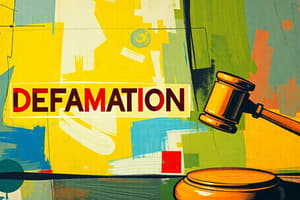Podcast
Questions and Answers
What is libel a form of?
What is libel a form of?
- Defamation (correct)
- False information
- Slander
- Misleading statement
Which type of statement is considered defamatory on its face without the need for any explanatory matter?
Which type of statement is considered defamatory on its face without the need for any explanatory matter?
- False light
- Libel per se (correct)
- Slander
- Libel
What is false light in the context of defamation?
What is false light in the context of defamation?
- A type of defamation that involves false information presented as news
- A type of libel that involves written or printed words
- A type of slander that involves spoken words
- A type of claim that arises when someone is portrayed in a false light (correct)
Is false or misleading information presented as news always considered libel?
Is false or misleading information presented as news always considered libel?
What is an example of libel per se?
What is an example of libel per se?
What is the key difference between libel and slander?
What is the key difference between libel and slander?
What is the primary distinction between opinion and fact in the context of libel?
What is the primary distinction between opinion and fact in the context of libel?
What is a key factor in determining whether a statement is likely to be seen as an opinion or an assertion of fact?
What is a key factor in determining whether a statement is likely to be seen as an opinion or an assertion of fact?
What is a possible defense to a libel claim?
What is a possible defense to a libel claim?
Is false or misleading information presented as news necessarily libelous?
Is false or misleading information presented as news necessarily libelous?
What is one of the circumstances under which a defamatory statement can be published?
What is one of the circumstances under which a defamatory statement can be published?
What type of statement is less likely to be seen as defamatory?
What type of statement is less likely to be seen as defamatory?
Flashcards are hidden until you start studying
Study Notes
True or False Libel: Understanding the Basics
Libel is a form of defamation, a legal term that refers to the act of making false statements that harm a person's reputation. Libel involves written or printed words, while slander involves spoken words. False or misleading information presented as news is not necessarily libel, but it can be depending on the context and how it is presented.
Libel Per Se
Libel per se refers to statements that are considered defamatory on their face without the need for any explanatory matter. These statements are typically viewed as stating a defamatory fact, and are not allowed to be presented as opinions or hyperbole. Some examples include:
- Charging someone with a crime
- Imputing a present infectious disease
- Implying that a person is unfit for their profession or business
- Implying that a person is impotent or lacking chastity
The specific examples of libel per se can vary by jurisdiction, and the definition of libel per se is not absolute. However, it is generally understood to refer to statements that are clearly defamatory without additional context.
False Light
False light is a type of claim that arises when someone is portrayed in a false light, meaning the information presented is factual but creates a false impression. False light claims are subject to the same constitutional protections as defamation, and a court would typically consider the general tenor and context of the statement, as well as the specific content and whether it is likely to be seen as factual.
Defenses to Libel
There are several defenses to libel, including the truth defense, the qualified privilege defense, and the fair comment defense. These defenses allow for the publication of defamatory statements under certain circumstances, such as when the statement is true or when the publisher had a duty to publish the statement.
Opinion vs. Fact
The distinction between opinion and fact is not always clear-cut, and some courts have said that statements made in the context of an Internet bulletin board or chat room are likely to be seen as opinions rather than assertions of fact. In general, however, a statement that is capable of being proven true or false is considered a fact, while a statement that is not capable of being proven true or false is considered an opinion.
Context is also important in determining whether a statement is likely to be seen as an opinion or an assertion of fact. A statement that is presented as a true but controversial opinion is less likely to be seen as defamatory than a statement that is presented as a factual assertion.
In conclusion, whether a statement is libelous or not depends on the context in which it is presented and whether it is capable of being proven true or false. While false or misleading information presented as news is not necessarily libel, it can be if it is presented as a factual assertion.
Studying That Suits You
Use AI to generate personalized quizzes and flashcards to suit your learning preferences.




